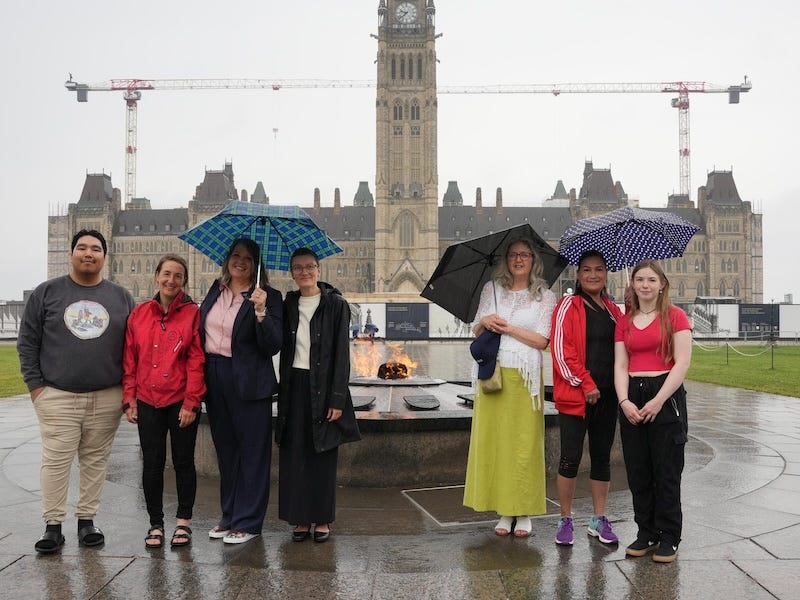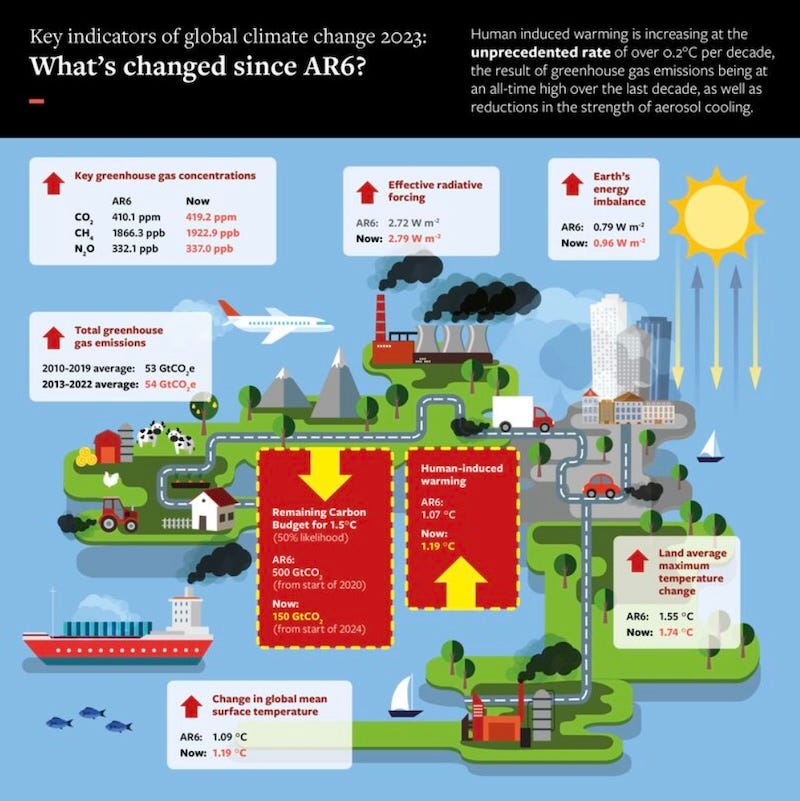Climate Survivors on Parliament Hill: Can a Least-Cost Strategy Bring Conservatives Onboard?
This week Ottawa heard the voices of Canadians who’ve lived climate change first hand. If this government is in its dying days, who will translate the message for conservative ears, big-C and small?

It was a signature moment this past week when five regular citizens who’ve lived through the devastating front-line impacts of climate change showed up on Parliament Hill to counter the latest round of high-powered lobbying from the country’s top fossil fuel companies.
The CEOs of Suncor Energy, Imperial Oil, Cenovus Energy, Shell Canada, and Enbridge inc. were hauled before the House Committee on Environment and Sustainability Thursday to explain their laggardly performance on emission reductions and make their latest pitch against federal restrictions on those same emissions. They all attended via videoconference, since they were far too busy and important to convene with the country’s elected representatives in person—though several senior fossil execs had time Wednesday for a half-day promo session in Toronto, hosted by the Economic Club of Canada.
While the CEOs showed up on the video screens in the House of Commons committee room, national media received a far more visceral snapshot of what happens when oil and gas companies keep pouring out climate pollution, in Canada and in fossil-producing countries around the world.
“Yesterday, Canadians came from across the country—braving extreme heat and torrential rain—to bring their powerful stories of climate impacts to Parliament,” Climate Action Network-Canada wrote on social media Friday. “Oil and gas CEOs, called to testify about their rising emissions amid record profits, didn't bother to show up.”
It was the latest in a series of recent media events and committee appearances on Parliament Hill as climate organizations push hard for decisive climate action before the next federal election—on the emissions cap, the Clean Electricity Regulations, restrictions on fossil industry methane emissions, Sen. Rosa Galvez’ Climate-Aligned Finance Act, and more.
But at the same time, we’re hearing more and more open discussion of the burning question that was still just the silent elephant in the room a few months ago.
If these are the dying days of a government that has been more onboard with emission reductions and the energy transition than any of its predecessors, what part of that work will survive a new regime that expresses its outright hostility in three-syllable rhymes?
And as a practical response to that question:
Who will translate the loss and pain and the opportunity and gain in the climate and energy story so the response to climate change makes sense to conservative ears, big-C and small? So that national policy sees and hears the communities that need it most?
A Tale of Two Testimonies
The heartfelt accounts from the community representatives and the bloodless generalities from the fossil execs pointed to an industry so totally divorced from the human and community impacts of what to them is just another day at the office. Or maybe at the friendly, neighbourhood tailings pond.
“Ten months ago, a wildfire destroyed my family’s home in Kelowna. I can never get back what we lost—the chair I rocked my grandson to sleep in, the staircase [where] I held my daughter after her first heartbreak, Christmas decorations my children made,” said Kelowna, British Columbia hairstylist and grandmother Heather Mackay. “Across Canada, people like me are losing our homes to wildfires. We can’t stop all wildfires or floods but we can prevent them from becoming more frequent and intense.”
“You just need to judge us by our actions and you’ll see continued reductions in our emissions,” said Imperial Oil CEO Brad Corson, speaking for the industry that accounts for about 31% of Canada’s emissions, is still seeing them increase, and produced more climate pollution in 2022 than buildings, heavy industry, and electricity combined.
“In the North, we’re seeing climate change up close. Our winters are getting shorter. Our spring is getting longer,” said Tuktoyaktuk, NWT filmmaker Darryl Tedjuk. “Up North, we hunt off the land and it keeps us healthy. With climate change, it’s harder and riskier to hunt because parts of the ice are getting thinner. Climate change is also making the sea level rise. The harbour in our village is at risk of eventually getting washed away. Local scientists said it will be gone in 15 years.”
A federal emissions cap is “unnecessary regulation”, but a carbon price—which costs oil companies just $1.67 per tonne of climate emissions—"will drive the innovation, the economic incentives on all of our part to continue to improve our businesses,” said Suncor CEO Rich Kruger, last seen doubling down on expanded fossil extraction in a previous Commons committee appearance.
“In November 2021, I woke up to water rushing through our yard and towards our house. Neither my daughter or I had ever been in a flood before. It was scary,” said Upper Nicola Band member Diana Boston, whose home was severely damaged in the Merritt, B.C. flood of 2021. “We left at 4:30 AM. Water continued to flow into the house until 9 AM. There are some things the flood ruined that I can’t get back—the antique vanity that my granny handed down to me, every father’s day gift my husband got in the last decade, that’s all gone. It took two years to repair our house.”
“Decarbonization helps everybody and that’s what we’re focused on,” Corson told the House committee. “When the oil industry is successful, is profitable, then everybody wins.”
“Those old farmer’s almanacs have nothing in them about how to prepare for a summer like last year’s, where a combination of extreme climatic events made it the last season for many farms in Quebec,” said Outaouais-area organic farmer Clémence Briand-Racine. “A six-week drought period and constant smoky air from forest fires all over the province was followed by two months of heavy rain every 12 hours,” along with hail and wind storms that could cause “absolute crop failure” if they repeat this year.
“A strong oil and gas sector is good for Canadians," said Cenovus CEO Jon McKenzie.
“The 2021 fire in Lytton devastated my community, and the impact of that trauma on our lives—and on our children’s lives—will last long after buildings are rebuilt,” said local author Meghan Fandrich. “Canadians are already suffering from climate disasters, and the frequency and intensity of those disasters are going to grow, from coast to coast to coast, unless we can curb the accelerating pace of climate change. We need a cap on fossil fuel emissions now—there is no time for more delays.”
"Repeatedly promising to reduce emissions and actually reducing emissions are not the same thing,” MC Bouchard, director of the Calgary-based Pembina Institute’s oil and gas program, said in a release. “Although the oil and gas executives all gave examples of past and present sustainability projects they have invested in, they did not speak to any comprehensive strategies or plans to meet their own emissions reductions targets.”
With a federal election looming, all the community voices we heard last week come from the people a wannabe-populist Leader of the Opposition says he speaks for. The self-justifying spin is from the industry that hopes the next government will hand it the lifeline it desperately needs as the world endorses a fossil fuel phasedown and lurches toward decarbonization.
Words to Be Heard By
As it happened, I was a couple of time zones away while the week’s activity was brewing on Parliament Hill, so I’ve reconstructed this story from media accounts and news releases. But it all reminds me of a moment (a moment long ago, in a universe far away) that I did witness first hand.
In October, 1980, I was part of the editorial team from Canadian Renewable Energy News that attended the Fifth National Passive Solar Conference in Amherst, Massachusetts. I’ve told the story in a bit more detail elsewhere, but every day of the conference was a triumphant, living, breathing snapshot of what a community of clean energy and green building practitioners had achieved, and the next round of breakaway successes that should have been right around the corner.
And we knew we were the walking dead. To get to sessions every morning, we had to walk past flags at half-mast for 66 American hostages in the U.S. embassy in Tehran. A national election was just a couple of weeks away, and Ronald Reagan was the sure winner. He and his cronies burned a burgeoning renewable energy sector to the ground in their first term of office, all in the name of a “level playing field” that somehow always managed to favour fossil fuels.
The echoes to Trump, to Pierre Poilievre, and to a left-leaning fossil fuel proponent like Mexico’s Claudia Sheinbaum are too obvious (and multi-partisan) to miss. And all of it, dontcha know, in the name of doing right by the kind of communities and households Poilievre says he represents, the ones whose needless suffering played out on Parliament Hill this past week.
The progress in Canada over the last 8½ years has been more equivocal than what we saw at Passive Solar ‘80, but still unmistakable. Now, once again, we’re at risk of seeing something powerful, positive, and deeply important reduced to shreds.
So the question is how to hold the ground we’ve gained and keep up the push for the deeper emission cuts, faster energy transition, and relentless community focus that represent our best chance at getting everyone through a massive, rolling climate emergency. Not unscathed, but as healthy and whole as we can. (Impossible as that may seem to some other columnists we’ve been reading lately.)
There are no guarantees—in this line of work, there never have been. And it will take a lot more than messaging to withstand the tough times that may be ahead.
But it starts with being heard. And that means finding the language that will make climate change and clean energy resonate in conservative ears, big-C and small, even if it means making the case while downplaying our standard “c-words” like “climate”, “carbon”, and “crisis”.
Two Simple Questions: Yes Or No?
The top-line agenda in the next election will be about limited government, local autonomy, and fiscal responsibility, you say? How might these simple, polite, yes-no questions play out on the campaign trail?
1. YES OR NO: If we all agree that we need to get carbon emissions under control, should governments prioritize the quickest, cheapest ways to get there?
2. YES OR NO: If private industry has another plan, that’s okay—that’s why we call them private. But should taxpayers foot the bill, or let them run roughshod and unregulated if we’re going to be left to clean up the environmental and social impacts?
And, crucially, how comfortably and consistently will climate and energy hawks be able to ask these questions, or questions like them, at every all-candidates’ meeting, of every candidate regardless of party affiliation?
Framing climate response as a least-cost energy strategy will be an important tool in our response to whatever’s next, not least because it works at all levels, from international policy to your own back yard.
The Intergovernmental Panel on Climate Change identifies solar, wind, and methane reductions in oil and gas as the cheapest paths to the fastest, deepest emission cuts by 2030. The slowest, most expensive options? Carbon capture and storage, and nuclear generation.
And the least-cost frame takes on a pretty much infinitely more urgent, human dimension when you listen to this week’s voices from Kelowna, Tuktoyaktuk, Upper Nicola, the Outaouais, and Lytton. They all remind us that the biggest, most important and lasting costs of climate change go so vastly far beyond what (even pro-carbon price) economists know how to add up.
Is this the kind of language that might begin to bring us all together and move climate response outside the climate “bubble”, before and during the election campaign, rather than driving us farther apart?
And if this line of thinking won’t quite get us there, what will?
Mitchell Beer traces his background in renewable energy and energy efficiency back to 1977, in climate change to 1997. Now he and the rest of the Energy Mix team scan 1,200 news headlines a week to pull together The Energy Mix, The Energy Mix Weekender, and our weekly feature digests, Cities & Communities and Heat & Power.
Chart of the Week

Climate Scientist Sheinbaum Wins Mexico Election, Pledges More Renewables and Gas
International Tariffs May Force a Poilievre Government to Unaxe the Tax
SMRs Too Expensive, Too Slow to Meet Grid Decarbonization Deadline: IEEFA
Battery Storage Fire in California Sparks Widespread Safety Concerns
‘STUNNING’ BETRAYAL: Transit Loses $1B as New York Suspends Congestion Pricing
Gas Industry Front Group Keeps Pitching LNG after Standards Body’s Greenwash Ruling Waits 3 Months
Montreal Adds Nine More Car-Free Streets after ‘Mind Blowing’ Success
New Tech Promises Faster Charging, Longer-Lasting EV Batteries
Make New Fossil Fuel Projects Taboo to Meet Paris Goals, New Report Urges
Oil and Gas Companies Are Trying to Rig the Marketplace: Dessler (New York Times)
Rich countries met $100B climate finance goal by ‘relabelling existing aid’ (Carbon Brief)
China Accelerates Grid Projects to Keep Up with Renewables Boom (Bloomberg)
War, what is it good for? Polluting the climate (Politico)
Coastal erosion threatens to wash away D-Day beaches (Canadian Broadcasting Corporation)
Dutch court stops gas development project in German North Sea (Clean Energy Wire)
Swing rural voters in UK show higher support for net zero and action on climate change (Energy & Climate Intelligence Unit)
Long-Range EVs Now Cost Less Than the Average New Car in the U.S. (Bloomberg)
California budget cuts could decimate key virtual power plant programs (Canary Media)
EU countries unanimously agree to quit energy investment treaty over climate concerns (Reuters)
Rystad Says Middle East Renewables Capacity Set to Soar (Rigzone)
Saudi Aramco Shares Slide on Output Curbs, Secondary Offering (Bloomberg)
Human-Made Noise Is Harming Ocean Life. Climate Change Could Make it Worse (Inside Climate News)
There's a climate threat lurking in rivers around the world. New research shows where (Canadian Broadcasting Corporation)
Lawsuits Targeting Plastic Pollution Pile Up as Frustrated U.S. Citizens and States Seek Accountability (Inside Climate News)






